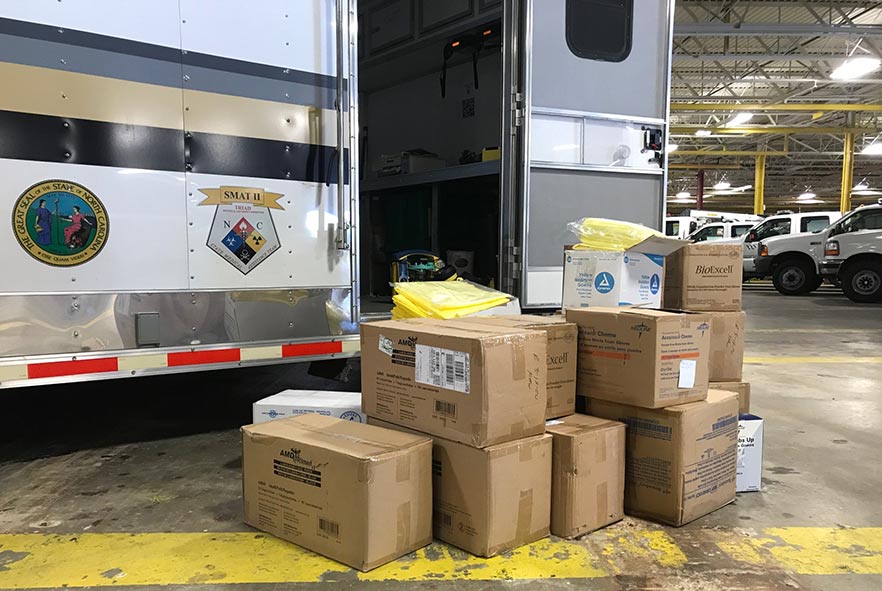WSSU helps with local PPE shortage

WSSU faculty and staff spearheaded a highly successful effort to collect personal protective equipment to go to local public health agencies.
Winston-Salem State University’s Office of Emergency Management is stepping up to help our community in the fight against COVID-19. Staff spearheaded a highly successful effort to collect personal protective equipment (PPE) to go to local public health agencies.
With PPE in such high demand and low supply, university departments didn’t hesitate to give up their inventory of safety materials. Special thanks to the Division of Nursing, Clinical Laboratory Sciences, Occupational Therapy, Physical Therapy, and Biological Sciences for depleting their supplies for our frontline workers.
The university was able to donate more than 10,000 nitrile gloves and 300 disposable isolation gowns. Both items are integral in protecting healthcare providers from high-contact patient activities that could result in the transfer of pathogens like COVID-19 to their hands and clothing.
“We knew we had to help,” said Dr. Celia Hooper, interim dean School of Health Sciences, “With students not being on campus, critical supplies were not being used, so we jumped at the opportunity to lend a helping hand. We’re all in this together. The more we can help each other, the better off we’ll all be.”
PPE supplies were donated to the Triad Healthcare Preparedness Coalition (THPC). This group is comprised of regional healthcare partners such as hospitals, EMS, public health, emergency management, public safety, and other health-related entities. Their mission is to help partners before, during, and after significant incidents or disasters to recover more quickly. THPC has a regional reach that covers 18 counties. Donated supplies will go to the partners most in need.
“Simply put, COVID-19 has decimated PPE supplies. Although the supply chain is getting better and we’re seeing a slow progression toward getting critical supplies replenished, there is still a significant gap. I am so proud to work for an institution that cares as much as WSSU. When we put out the call, supplies came flooding in within days, said Jason Stogner, director of Emergency Management.
WSSU’s Office of Emergency Management continues to stay abreast of the local efforts to combat the spread of COVID-19.
With PPE in such high demand and low supply, university departments didn’t hesitate to give up their inventory of safety materials. Special thanks to the Division of Nursing, Clinical Laboratory Sciences, Occupational Therapy, Physical Therapy, and Biological Sciences for depleting their supplies for our frontline workers.
The university was able to donate more than 10,000 nitrile gloves and 300 disposable isolation gowns. Both items are integral in protecting healthcare providers from high-contact patient activities that could result in the transfer of pathogens like COVID-19 to their hands and clothing.
“We knew we had to help,” said Dr. Celia Hooper, interim dean School of Health Sciences, “With students not being on campus, critical supplies were not being used, so we jumped at the opportunity to lend a helping hand. We’re all in this together. The more we can help each other, the better off we’ll all be.”
PPE supplies were donated to the Triad Healthcare Preparedness Coalition (THPC). This group is comprised of regional healthcare partners such as hospitals, EMS, public health, emergency management, public safety, and other health-related entities. Their mission is to help partners before, during, and after significant incidents or disasters to recover more quickly. THPC has a regional reach that covers 18 counties. Donated supplies will go to the partners most in need.
“Simply put, COVID-19 has decimated PPE supplies. Although the supply chain is getting better and we’re seeing a slow progression toward getting critical supplies replenished, there is still a significant gap. I am so proud to work for an institution that cares as much as WSSU. When we put out the call, supplies came flooding in within days, said Jason Stogner, director of Emergency Management.
WSSU’s Office of Emergency Management continues to stay abreast of the local efforts to combat the spread of COVID-19.
